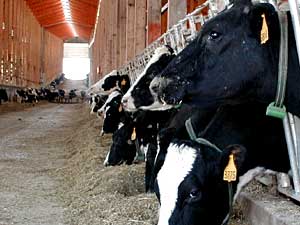|
Audio
Photos
Resources
Your Voice
|
Beef industry counting on consumer confidence
December 29, 2003
 |
| The BSE case in Washington has caused concern among dairy and beef cattle farmers in the Midwest. (MPR file photo) |
Moorhead, Minn. — U.S. Sen. Byron Dorgan, D-N.D., wants Agriculture Secretary Ann Veneman to convene a summit in January. Dorgan says farmers, ranchers and consumers need to air their concerns about BSE.
Dorgan also charges the Bush administration has failed to fund country-of-origin labeling.
"Country-of-origin labeling is the law of the land. We passed it and the U.S. Department of Agriculture has failed to implement it," says Dorgan. "They now have a requirement to implement the country of origin labeling so the American consumer knows where their meat comes from. They can look at their necktie, or their shirt, or their shoes and find a label that tells them where that came from, but they can't tell where the meat comes from."
 | |||
Other members of Congress say testing of the meat supply could be improved. U.S. Rep. Collin Peterson, DFL-Minn., wants a national tracking system for cattle.
Those in the beef industry know they must respond to such concerns.
Dennis Swan raises beef cattle near Balaton, Minnesota, and is chairman of the Minnesota Beef Council. Swan is convinced American beef is safe, but he says testing and monitoring of the beef supply will be improved. The U.S. Department of Agriculture has already announced it will test twice as many cattle as the 20,000 tested for BSE this year.
"I would say there's going to be more testing done. A higher percentage of cattle that go to be harvested will be tested," says Swan. "The tracking of cattle, they're working on an ID system. I guess we've talked about it for a number of years and never done much about it."
Swan says the beef industry has been working for several years on a cattle identification system. He says the BSE case in Washington state will likely expedite implementation of such a system.
|
I talked to quite a few of my customers since this come out, and some guys are pretty nervous and running scared, and other guys are pretty optimistic.
- Beef farmer Gary Jacobson |
Gary Jacobson raises certified Red Angus beef near Hitterdahl, Minnesota. He says he keeps detailed records about cattle he raises. Jacobson says computer chips can be put under an animal's skin at birth, allowing the animal to be tracked as it moves from farm to farm and eventually to the slaughterhouse. He expects such a system to be mandated in the future. Jacobson says the current cost is about $5 per animal.
"It's going to be an extra expense we get stuck paying, you know. When something has to be paid the cowman pays it," says Jacobson. "But it's going to turn out to be cheap insurance, just to keep the consumer confident in his product."
Jacobson says farmers he's talked with are generally optimistic the beef industry will survive.
"I talked to quite a few of my customers since this come out, and some guys are pretty nervous and running scared, and other guys are pretty optimistic. I guess I'm one that thinks it's going to be better in the long run. It's going to make for better identification on everything, and a better product down the road," says Jacobson.
That's the message the beef industry is hoping consumers will accept. North Dakota State University Agricultural Economist Cole Gustafson says it's still not clear how consumers will react to mad cow disease.
"If they're going to start to curtail their purchases of some products or favor other products, maybe there'll be a premium placed on organic foods in the future, or foods that have documented histories," says Gustafson. "We're going to have to see how sensitive consumers are to these issues."
Gustafson believes the loss of export markets like Japan will hurt beef prices in the short term. It's estimated the industry could lose between $6 billion and $15 billion. But the U.S. exports only about 10 percent of its beef production. That means the critical challenge for the beef industry is convincing American consumers to keep buying beef.
|
News Headlines
|
Related Subjects
|
